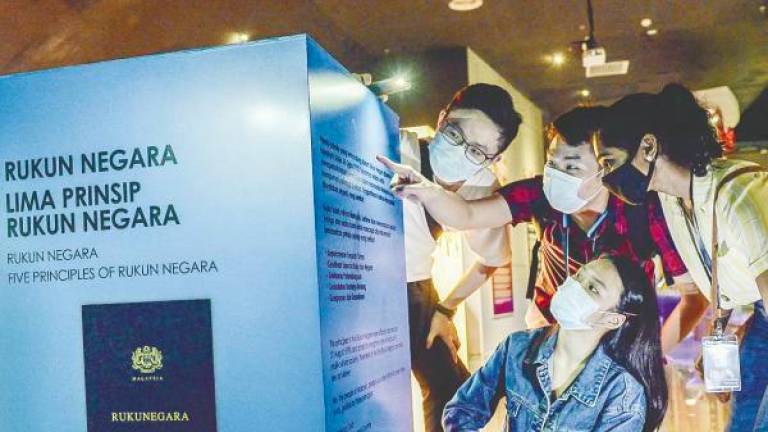By LIEW JIA TENG
FEW would disagree that most multinational corporations invariably favour Singapore over Malaysia when it comes to setting up their regional base or corporate headquarters.
In recent years, other Asean countries – Vietnam, Indonesia and the Philippines, in particular – have also leapfrogged Malaysia as the preferred destination.
Facebook, Google, Amazon, Tencent Holdings, BT Group, BMW, Grab Holdings, Uber Technologies, Allianz, Vodafone Group, Bombardier, Akzo Nobel and CMA CGM are just some of the companies that have made Singapore their Asia-Pacific operational hub.
This is primarily because of the city state’s pool of highly qualified human capital, efficient business infrastructure and stable political environment, as well as effective legal, regulatory and tax frameworks.
Over the years, Malaysia has managed to attract a group of MNCs, including Honeywell International, B. Braun, Kaspersky and Petersime, but there is no denying that we lag far behind our neighbour down south.
Even though big names such as Alibaba Group Holding, Huawei Technologies and SK Group have announced plans to set up regional offices in Malaysia, the current status of their plans remains unclear.
Notably, Zoom Video Communications said last month that it would expand its presence in Singapore by opening a research and development (R&D) centre and immediately hire hundreds of engineering staff for the new operations.
The video-conferencing services provider said in a statement that it was also doubling its data centre capacity in the country.
In contrast, Hyundai Motor Corp has reportedly closed its Asia-Pacific regional headquarters in Malaysia and moved to Indonesia, owing to President Joko Widodo’s strong commitment to promoting electric vehicles.
Given that competition to lure the big names is always increasing, how can Malaysia make itself more attractive? What else can it offer and which areas in particular need improvement?
In an email response to The Edge, the Malaysian Investment Development Authority (Mida) acknowledged that Malaysia’s continued competitiveness is now dependent on strengthening the manufacturing and service sectors and accelerating the shift to innovation-led industries.
“A special focus is required to strengthen innovation and deliver new or enhanced products or processes into the global market towards enhancing economic growth and competitiveness,” it says.
Moving forward, R&D, technology, innovation and productivity will be key to ensuring that Malaysia continues to develop its high technology manufacturing and related service sector, in line with the new national policy framework on Industry 4.0 that is currently being formulated by the government, adds Mida.
Reverse the perceptions
Anand Chelliah, managing partner and Asia-Pacific leader of tax and advisory services at Baker Tilly Malaysia, acknowledges that Singapore is a more developed economy that offers better legal and business-friendly policies to MNCs wishing to locate or relocate their senior management teams.
“Despite the relatively higher cost of establishing the HQ in Singapore compared with Malaysia, it is perceived that the international linkages as a financial and business centre, coupled with the much-lower tax regime and first-class infrastructure offered by Singapore to such MNCs, outweigh this higher cost,” he tells The Edge.
A comparison of tax incentives between the two countries, he says, suggests that these incentives are not necessarily the main factor in the decision on where to locate.
Anand points out that although Malaysia offers an English-speaking local talent pool, Singapore’s is perceived to be of a higher calibre based on the quality and superiority of its education system compared with Malaysia’s.
As such, more needs to be done to reverse the factors that have contributed to the perception that Malaysia is less attractive as a regional HQ destination than some of the other countries.
“It begins with redesigning our social, legal, tax and other regulatory frameworks to assure MNCs that, in addition to lower relative investment costs, Malaysia can offer the right quality of infrastructure, workforce and sustainable policies in an environment that is free from political uncertainty, discrimination and inequity for the long term. We must not overlook the fact that MNCs need to adhere to their governance and sustainability obligations,” he says.
A true one-stop centre
Koong Lin Loong, head of the Associated Chinese Chambers of Commerce and Industry of Malaysia’s SMEs and taxation committee, points out that Malaysia’s position is neither here nor there – it is losing out on the lower end, which is labour intensive, as well as at the higher end, which is IT intensive.
“Many MNCs chose Malaysia as a manufacturing base because we could offer them facilities and infrastructure such as airports, ports, plenty of land and cheap electricity. But today, we are losing out to the countries in the Mekong region such as Vietnam, Laos, Cambodia and Myanmar,” he says.
Koong adds that while Singapore is one of the world’s best financial hubs, Malaysia too has some good measures and policies, but they are not being executed well.
“In terms of infrastructure, Malaysia is obviously better than the countries in the Mekong region and, maybe to a certain extent, Singapore. We have to capitalise on these advantages to attract FDI (foreign direct investment).
“We have to be perceived as a hub for Asean. If you look at our land and utility costs, we are not as expensive as Singapore. We need to work harder to displace Singapore as the preferred destination to set up a regional office.”
He points out that it is important to enhance the ease of doing business by providing MNCs with a true one-stop centre, freeing them from having to go through too many approval applications and processes.
“We don’t want MNCs to receive multiple instructions from multiple agencies. We should revitalise private investments and create a predictable regulatory environment. We cannot allow MNCs to be caught by surprise.”
More importantly, policies and regulations, from federal to local council level, must have clarity, consistency and continuity, says Koong.
“The last thing we want to see is MNCs getting approval from the federal government, but not getting the green light from the local authorities for certain reasons.”
Cost efficiency
Peck Boon Soon, a former economist at a local investment bank, says The World Bank Group ranked Singapore second in ease of doing business in 2019, whereas Malaysia was ranked No. 12.
“I often hear that some manufacturers prefer to ship their products out of Singapore rather than Malaysia due to the cost efficiency.
“The regional headquarters is meant to provide support to the MNCs’ businesses in this region. As the set-up would generally not be too big, the emphasis for these MNC regional headquarters, I believe, will be on how fast and efficiently they can get their jobs done.”
Meanwhile, Association of Malaysian Medical Industries executive director Ching Choon Siong says one of the important functions of regional offices is regulatory affairs.
“Singapore trains a lot of people in regulatory affairs to convince companies to set up there.
“Essentially, regional HQs are office-based jobs and managerial positions. If we can create this, it will help to occupy the offices. It has a real economic impact. Our cost is very competitive compared with them. The idea is that we need to focus on our strengths.”
Sunway University Business School economics professor Dr Yeah Kim Leng is of the view that Singapore is well known for its rule of law, good governance and corruption-free administration, in addition to having a world-class civil service.
Through agglomeration effects, the country’s airline, seaport and telecommunications connectivity, which is global in reach, attracts more international players and investors in a virtuous circle. The world’s top talents and businesses gravitate towards the hub that
Singapore has created because of its high-value services and the ability to pay high wages in a strong currency.
“We should position ourselves appropriately first, as a spoke, and then turn it into a mini hub by capitalising on our advantages. Only when the ecosystem is established and we have attained comparable levels of efficiency and attractiveness can we compete head to head with Singapore,” says Yeah.
Interestingly, many prominent technology firms in the US, including Hewlett-Packard Enterprise and Oracle, just this year announced plans to relocate their headquarters from Silicon Valley in California to Silicon Hills in Texas.
Billionaire Elon Musk personally moved to Texas in early January, although his companies, SpaceX and Tesla, maintain major operations in California, for now.
Those who have left the San Francisco Bay Area often complain of mismanagement of the city and state. According to news reports, Silicon Valley has notoriously high real estate prices while personal income tax rates are high in California, whereas Texas has none.
Perhaps Malaysia can take a leaf from Texas’ book and learn a lesson from the tech exodus from California.
This article first appeared in The Edge Malaysia.













